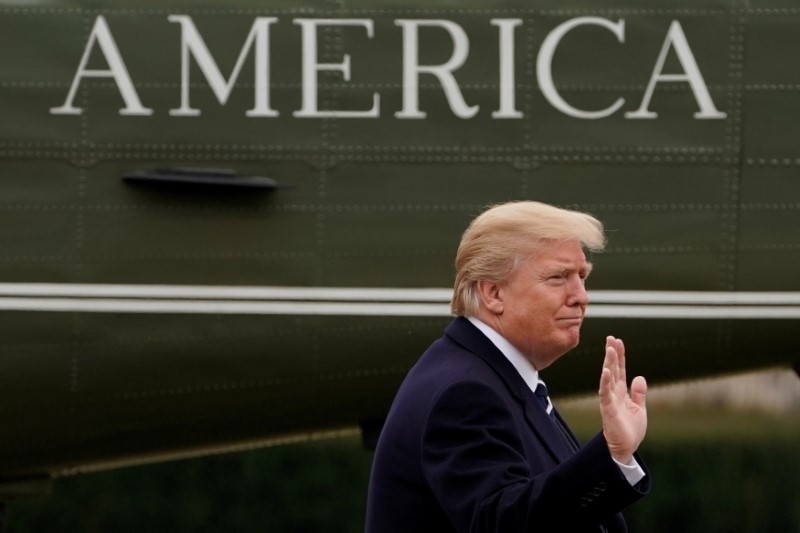Investing.com - Here are the top five things you need to know in financial markets on Wednesday, July 11:
1. Trump Escalates U.S.-China Trade War With $200B Tariff Threat
The Trump administration raised the stakes in its trade dispute with China, threatening 10% tariffs on an extra $200 billion worth of Chinese imports late Tuesday, pushing the world's two biggest economies ever closer to a full-scale trade war.
The tariffs will not go into effect immediately but will undergo a two-month review process, with hearings August 20-23.
Washington proposed the extra tariffs after efforts to negotiate a solution to the dispute failed to reach an agreement, senior administration officials said.
China accused the U.S. of bullying and warned it would hit back, but did not immediately say how it would retaliate.
It was the latest development in escalating trade tensions between the world's two largest economies.
Last week, Washington imposed 25% tariffs on $34 billion of Chinese imports, and Beijing responded immediately with matching tariffs on the same amount of U.S. exports to China.
Investors are worried that threats of higher U.S. tariffs and retaliatory measures by others could hit global growth and damage sentiment.
2. Trump Arrives At NATO Summit; Launches Tirade At Germany
Meanwhile, Trump kicked off his visit to Europe at a summit of leaders of NATO countries in Brussels, where he is expected to hammer home his calls on other countries to spend more on defense.
While not on the summit's official agenda, European leaders will voice their trade concerns to Trump, diplomats said.
Trump has vowed to stick to his promises of protection for U.S. industries against what he says is unfair competition from the European Union.
Speaking at a press conference in front of NATO representatives ahead of the two-day summit, Trump launched a scathing attack on Germany, saying a flurry of oil and gas deals had given Russia far too much influence over the continent’s largest economy.
In particular, he singled out the Nord Stream 2 gas pipeline project as being especially "inappropriate."
“Germany is totally controlled by Russia … They will be getting between 60% and 70% of their energy from Russia and a new pipeline, and you tell me if that is appropriate because I think it's not,” Trump said, before criticizing Berlin's failure to significantly increase defense spending.
3. Fresh Shots In Trade War Drag World Stocks Lower
Global stocks traded sharply lower, as investors sold off risk-sensitive assets following the latest escalation in trade war rhetoric from the White House.
Stocks in Asia were hit hard on the news, with Chinese markets faring the worst. The Shanghai Composite index lost 1.8%, and the blue-chip CSI300 index dropped around 1.7%.
Elsewhere, European shares were down more than 1% in mid-morning trade, with all sectors in the red. Basic resources and autos, seen among the sectors most at risk of a trade war, led losses. Among national indexes, Germany's export-heavy DAX slumped 1.2%, while Britain's FTSE declined 1.3%.
On Wall Street, U.S. stock futures pointed to a sharp drop at the open. The blue-chip Dow futures were down 220 points, or around 0.9% at 5:30AM ET, the S&P 500 futures dropped 22 points, or roughly 0.8%, while the tech-heavy Nasdaq 100 futures indicated a decline of 69 points, or about 1%.
4. Dollar Edges Higher Against Main Rivals
Away from equities, the dollar edged higher against a currency basket, as U.S. threats of tariffs on an additional $200 billion worth of Chinese goods prompted knee-jerk selling of riskier assets against less vulnerable currencies.
The U.S. dollar index, which measures the greenback’s strength against a basket of six major currencies, was up 0.3% to 94.18.
Meanwhile, in the bond market, U.S. Treasury prices edged higher, pushing yields lower across the curve, with the benchmark 10-year yield inching down to 2.84%.
The economic calendar will be light with producer prices for the month of June due at 8:30AM ET the only economic report of note.
5. Oil Prices Sink; Fresh Weekly U.S. Inventory Data Ahead
Oil prices were under pressure, with Brent dropping by more than $1, as investors digested the latest developments in the deepening trade conflict between the U.S. and China and after U.S. said it would consider requests for waivers from sanctions due to snap back into place on Iranian crude exports.
Brent crude futures were down $1.70, or almost 2.2%, at $77.16 a barrel. U.S. crude was down 56 cents, or 0.8%, at $73.55.
The U.S. Energy Information Administration (EIA) will release its official weekly oil supplies report for the week ended July 6 at 10:30AM ET, amid forecasts for an oil-stock drop of 4.4 million barrels.
The data will also offer fresh indications on how fast domestic output levels continue to rise. U.S. crude production - driven by shale extraction - is currently at an all-time high of 10.9 million barrels per day (bpd).
After markets closed Tuesday, the American Petroleum Institute said that U.S. oil inventories fell by 6.8 million barrels last week.
